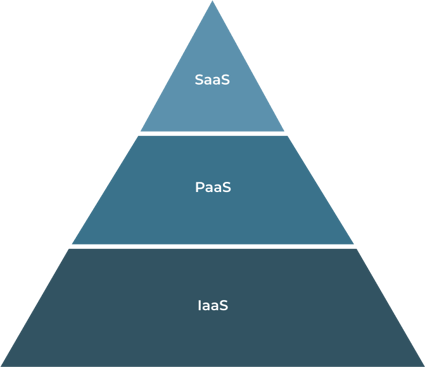Heroku vs. AWS: What to Know Before Choosing a Cloud Provider
By: Jeff French
| March 31, 2023

Ready to migrate your application development, deployment, and management to the cloud? There are many choices out there - and many factors to consider.
Read on to learn the differences between Heroku and Amazon Web Services (AWS). You’ll also learn the basics about SaaS, PaaS, and IaaS - and what differences to consider before making a decision.
If you’re looking for expert advice geared for your business, then click the link below to schedule a call with one of our cloud modernization experts. You’ll save time and learn about the best deployment solutions aligned with your applications, team strengths, and business goals.
First, Let’s Go Over IaaS vs. PaaS vs. SaaS
Before we get into the details of choosing between AWS and Heroku, let’s go over the following concepts:
- Infrastructure-as-a-Service (IaaS)
- Platform-as-a-Service (PaaS)
- Software-as-a-Service (SaaS)
Clarifying the differences goes a long way toward understanding how Heroku and AWS differ, and why a business would choose either option.
Infrastructure-as-a-Service (IaaS)
IaaS is a cloud computing service model where a third-party provider hosts and manages IT infrastructure, including:
-
Storage
-
Servers
-
Networking
-
Other computing resources over the internet
IaaS essentially allows your organization to use computing resources on a pay-as-you-go model. Businesses choose IaaS because it enables them to outsource complex infrastructure requirements and avoid hardware, software, and maintenance costs.
IaaS additionally helps businesses quickly scale their IT infrastructure up or down as required. Organizations also choose IaaS because it allows them to outsource maintenance to the provider while having full responsibility for managing their data and applications.
Examples: AWS, Microsoft Azure, Google Cloud Platform
Platform-as-a-Service (PaaS)
PaaS is a cloud computing service model where a third-party provider offers a platform for customers to develop, run, and manage applications. Similar to IaaS, a PaaS allows businesses to run their applications over the internet without addressing the underlying technical infrastructure.
PaaS provides a comprehensive app development and deployment environment, including features, tools, middleware, databases, operating systems, and runtime environments. Clients focus on application development, deployment, and maintenance, while the PaaS provider takes care of the underlying infrastructure, maintenance, security, and scalability.
Examples: Heroku, Microsoft Azure, AWS, Google App Engine
.
Software-as-a-Service (SaaS)
SaaS is a cloud computing business model where customers subscribe to a cloud-based software service provider online. Customers access the software over a web browser or dedicated application, and the provider maintains the software, including security, scalability, and updates.
Examples: Microsoft Office 365, HubSpot, Dropbox, Quickbooks
The Main Difference Between Heroku and AWS
The main difference between these services is that Heroku offers a PaaS while AWS provides all three: SaaS, PaaS, and IaaS.

Heroku essentially runs on AWS’ IaaS infrastructure. As a result, businesses choose Heroku because it doesn’t require extensive infrastructure knowledge, nor does it need DevOps resources.
Now, let’s get into the details about each platform and why a business would choose either option.
What is Heroku?
Heroku is a PaaS platform based on a managed container system that enables developers to build, run and scale web and mobile apps. It has been in development since 2007, and was acquired by Salesforce in 2010.
Heroku has many benefits, making it a popular option for smaller organizations and startups. The platform is based on an app-centric approach to application delivery, and it integrates easily with the most popular developer tools and workflows. It was first built to support the Ruby programming language, and has since evolved to support other widely-used programming languages, including Python, PHP, Java, Node.js, Scala, Clojure, and Go.
Many businesses choose Heroku because it minimizes cloud infrastructure setup time, enabling developers to focus on developing applications.
Heroku and all its partner applications are hosted on AWS, which handles computing resources, including servers, networks, operating system selection, load balancing, storage, server logging and monitoring, health monitoring, container organization, and more.
Heroku offers three primary tools: Developer Experience (DX), Heroku Operational Experience (OpEx), and Heroku Runtime.
Heroku Developer Experience
Heroku Developer Experience (DX) simplifies application deployment by allowing developers to deploy from source code management tools like Git and GitHub without requiring additional infrastructure management. DX also integrates with the Heroku Dashboard to give insights into real-time performance visibility, making it easy for teams to manage their web applications online.
Heroku Operational Experience
Heroku Operational Experience (OpEx) provides critical insights that enable developers to troubleshoot and remediate issues while customizing the operations experience. OpEx additionally provides tools that identify and address application trends and health, alert teams of pending issues, and scale web dynos automatically if the request response time exceeds a predetermined threshold.
Heroku Runtime
Heroku runs applications inside dynos - smart containers in a fully managed runtime environment. Developers deploy their code to a build system that executes the application. System and language stacks are then monitored, patched, and upgraded without manual intervention.
Other features of Heroku include:
- Heroku Postgres - a secure and easily scalable Postgres SQL database as a service optimized for application developers
- Heroku Data for Redis - a management and delivery service that allows developers to improve performance visibility and manage instances with a robust CLI
- Apache Kafka on Heroku - tools for partition and topic management, log compaction, and metrics
- Heroku Connect - an application that enables teams to build Heroku apps that seamlessly share and synchronize data between Salesforce and Heroku Postgres databases
- Heroku Enterprise - software that enables teams to manage enterprise application development processes, resources, and users
- Heroku Elements - a tool that allows developers to extend applications with pre-integrated third-party cloud services that immediately extend apps with a range of functionality
- Heroku Teams - software that enables developers to add and manage members with fine-grained access control
What is AWS?
As mentioned previously, AWS offers all three categories of cloud computing services: IaaS, PaaS, and SaaS.
In terms of PaaS, AWS offers both an application development platform and a framework with its AWS Lambda service.
AWS Lambda
Like most PaaS services, Lambda enables teams to run code without provisioning or managing infrastructure. Instead, developers can just write and upload code as a .zip file or container image.
Lambda also automatically adjusts to handle requests at any scale - from as few as a dozen events per day to hundreds of thousands per second. It's also cost-effective, allowing businesses to pay for the computing time required per millisecond. Organizations also choose Lambda because it optimizes performance and code execution time using the correct function memory size, and can respond to high demand in double-digit milliseconds.
Amazon Elastic Compute Cloud
Amazon Elastic Compute Cloud (EC2) is an AWS IaaS offering that lets developers access reliable infrastructure on demand with tools to migrate and build apps. Clusters can also be managed by widely-used systems like Kubernetes, with fast auto scaling (within minutes) and 99.99% availability (according to AWS). Data is secured with AWS's Nitro System.
To simplify, think of EC2 as a virtual server that runs an operating system with storage, memory, and CPU. Pricing depends on specs and duration. Costs increase depending on server size and how much it’s used.
EC2 vs. Lambda
The choice between EC2 and Lambda is analogous to Heroku vs. Lambda. Lambda and Heroku are PaaS offerings, while EC2 is an IaaS service that requires additional technical expertise to optimize the underlying infrastructure.
Heroku vs. AWS Lambda: The Technical Differences
Lambda and Heroku are both cloud-based PaaS services, however they differ significantly in how they deploy and scale applications.
Lambda is a serverless computing platform that allows developers to execute code without dealing with server management. Customers are only charged for the duration of their code execution, and the service scales automatically to handle high traffic and workloads.
Some businesses choose Lambda because it integrates well with other AWS services, including S3, DynamoDB, and SNS, making it an ideal option for building event-driven applications and microservices.
In contrast, Heroku is a PaaS that offers teams a relatively faster and easier way to build, deploy, and scale applications. With broad support for multiple popular programming languages and frameworks, it provides a user-friendly web interface that simplifies application management. Heroku is also best suited for web applications and API backends requiring traditional server-based architecture.
Moonswitch helps you choose the right PaaS solution for your business
Many PaaS solutions are available for developing, deploying, building, and managing your applications. Save time and gain clarity with a quick consultation with one of our cloud modernization experts.
We’ll analyze your requirements and give you a quick rundown of the best options that align with your applications, team strengths, and business goals.

